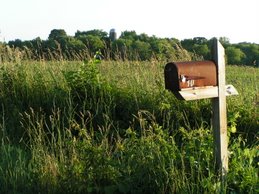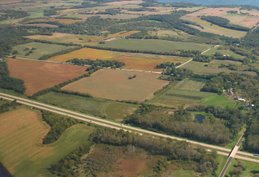I’m finishing up the last chapters of “Stumbling on Happiness” by Daniel Gilbert (link here), an entertaining and thought-provoking book about how the mind works. What does the mystery of the mind have to do with Fitchburg? Plenty!
Gilbert explains that based on various studies “Starting points matter because we often end up close to where we started.” So, it was inevitable that after a maximum growth rate for Fitchburg of 75 acres per year was voted in, it would be seen as a target instead of a maximum. (Those of you who follow Council and Commission meetings may remember that I predicted this danger at the time. But admittedly, it was intuition not research that led me to that conclusion.) Every time I’ve heard it mentioned since then, the statement includes a comparison such as “we have enough land already identified in the Urban Service Area to last for X years at 75 acres per year.”
However, back on Feb. 20th, before this “maximum” was established, a presentation to the Planning Commission by city staff included the statement that, as of 2005, we had about 1,000 acres left to develop within the current Urban Service Area (USA) so we only need to add 250 acres from outside the USA to take us from 2005 to 2030. The assumption was based on a growth rate of, not 75, but 50 acres per year.
I don’t want to stray too far, but the February presentation also included an example of what would happen if we continue to develop at 100 acres per year which is close to the 104 acre average since 1990. The result when factoring in a “50% flexibility factor” is that by 2060, we’d use up roughly 10,000 of the remaining 11,000 acres that could be developed outside of the current Urban Service Area. If you aren’t alarmed, reread the last sentence! Let me put it another way. Under this scenario, all but a small portion of our entire 36 square mile city that isn’t preserved as a park or someone’s lawn could be covered with roads and roofs by 2060.
What if we want to protect more farmland and open space and “only” pave over 50 acres per year… or even 25 acres? Those amounts are still less than the maximum established (so they meet that criteria) but they are no longer even being considered as options at any of the meetings I’ve attended (and I haven’t missed many in the last six months). Was silencing all other discussions about Fitchburg’s rate of growth the intent of the 75 acre per year maximum or was it one of those unintended consequences?
This brings me back to the happiness problem. It turns out that it is quite difficult for us to predict what will make us happy in the future partly because, as Gilbert explains, “we use our present feelings as a starting point” and we “expect our future to feel a bit more like our present than it actually will.” So, when Steve or Hans or Phyllis describe a future with fewer car trips, we can’t imagine it since that’s not what most of us are currently experiencing.
Remember being warned that you should not grocery shop when you are hungry because you’ll buy things you don’t need? Similarly, we shouldn’t shop for Fitchburg’s Future with gasoline in our veins. It’s going to sway our judgment.
Instead, what if we used the gas shortages of the 1970s as our starting point when talking about the future of Fitchburg? (You may need to ask your parents or the all powerful Google about this if you are under 50.) How would being able to walk or bike to work, or the convenience of taking a commuter train or an express bus, compare with being stalled in traffic jams and waiting in line for hours every time you had to buy gas at ever increasing prices?
I contend that if you walked up to someone, who anticipated an hour or more wait to buy gas (like the picture below), and offered them an instant ticket on the Fitchburg Express (and a convenient way to get to the terminal), you could probably convert an unhappy driver into a happy passenger.
Line at gas station on Sept. 15, 1979 (from Wikipedia)

Another limitation of our brain, that affects our happiness, is described by Gilbert this way: It is “so much easier for me to remember the past than to generate new possibilities. I will tend to compare the present with the past even when I ought to be comparing it with the possible.” In this case, the past is not the 1970s but the more recent past. We have a hard time generating new possibilities going forward. This takes vision and requires a willingness to consciously remove some things from the table to make room for new ideas. By design, most of us are not gifted in this area. (More about this later.)
Our lack of vision also means that we often “fail to realize that our future selves won’t see the world the way we see it now.” I believe our inability to recognize that our future selves will be living in a different world, (with a different set of facts, and therefore a different set of values and beliefs), hinders our ability to make the changes necessary to create a better future.
It turns out that we are programmed to pay attention to the things we want to hear, to remember details that support our views, and to accept a lower standard of proof for facts with which we agree. While that seems like a rather immature way to act, it’s all in the name of happiness. In Chapter 8 - Paradise Glossed, Gilbert explains that people have a “Psychological Immune System that defends the mind against unhappiness in much the same way that the physical immune system defends the body against illness… A healthy psychological immune system strikes a balance that allows us to feel good enough to cope with our situations but bad enough to do something about it.”
Yes, there is trouble with happiness. We need to happily cope with today’s problems. But, let’s not let things get bad before we do something about them, because today’s solutions (including inaction) could create irreversible problems in the future. And that’s a place that we (or someone we love) must live.



1 comment:
What a wonderful set of insights! I have just started my first formal economics course this semester and the first thing you learn is that the past should not dictate your future. To put it in planning terms - just because you have invested zillions of dollars in a nationwide driving infrastructure doesn't automatically mean you should continue to do so. Economic choices must always be evaluated based on present and future needs.
Post a Comment